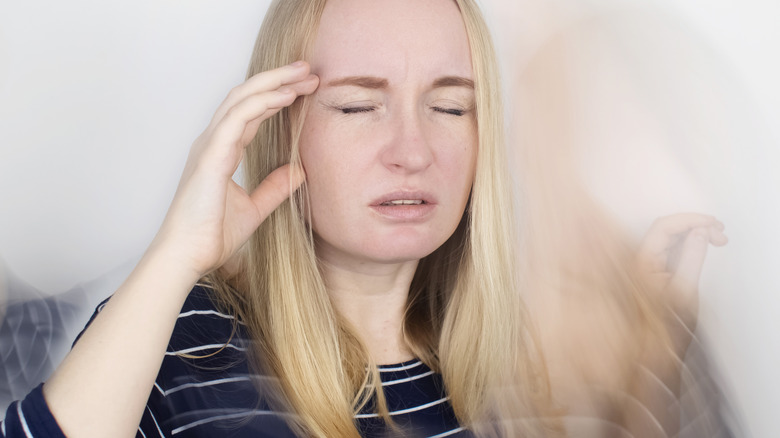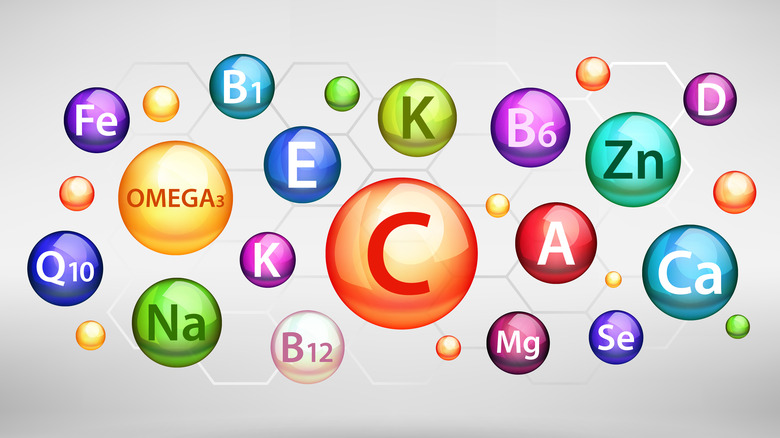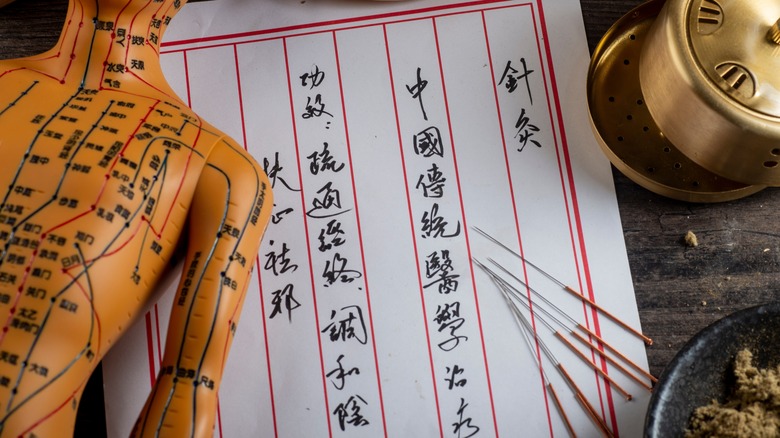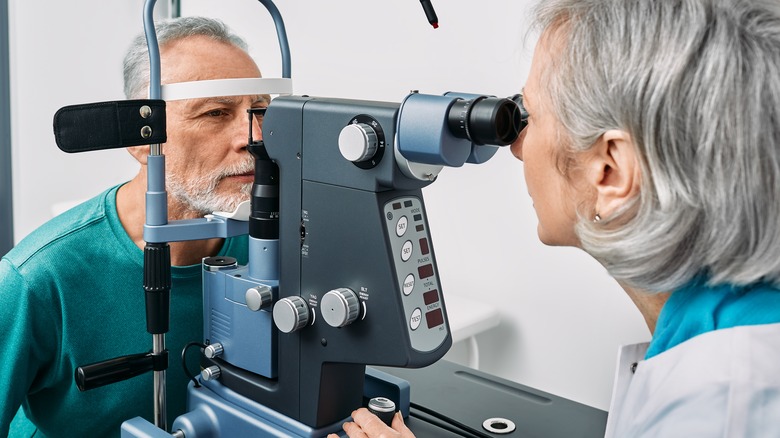15 Ways To Treat And Prevent Dizziness
Feeling dizzy can mean different things, depending on who you ask. Some may describe it as losing balance, while others may feel it as light-headedness or faintness. A common term often mistakenly used to describe dizziness is vertigo. It is feeling like you or your surroundings are moving, even though everything is completely stationary (via Merck Manual). Vertigo is a specific type of dizziness, while dizziness is an umbrella term for various (but similar) sensations.
Many things can cause dizziness, most of which are related to your diet, environment, or underlying medical conditions. According to Healthline, these include dehydration, low blood sugar, anxiety, motion sickness, medications, and alcohol. Vertigo, on the other hand, is often caused by damage to your vestibular system or central nervous system. The vestibular system is a network of various structures that functions to maintain your balance and orient you to your surroundings. Conditions that can cause vertigo include benign paroxysmal positional vertigo (BPPV), Meniere's disease, vestibular neuritis, Parkinson's disease, tumors, and stroke.
As a child, you may remember spinning around really fast until the world around you started to blur. You may have even enjoyed that funny feeling and thought of it as a game. But it is different when dizziness comes on unexpectedly. It can get very uncomfortable and sometimes even debilitating. Fortunately, it does not always have to feel that way. There are many things you can do to relieve your dizziness or prevent it from happening in the first place.
Drink plenty of water
A very common cause of dizziness is dehydration. Oftentimes, we forget how important it is for us to drink water. Potable water is available virtually anywhere in the United States, yet it gets pushed in the background and replaced with unhealthy beverages.
According to Harvard Health, the amount of water a person needs to drink in a day depends on many factors. Generally, it is around four to six cups, but this can increase or decrease depending on what your body needs. For example, if you exercise or sweat a lot, you need to replace the fluid you lose by drinking more water than you normally would. On the other hand, if you have a condition that causes your body to retain water (e.g., congestive heart failure, kidney failure), your doctor may advise you to drink less. Westside Head & Neck explains that when you are dehydrated, less fluid (and blood) circulates in your body — and when your brain has inadequate circulation, dizziness can occur.
It is important to note, however, that too much of something good can also become harmful. But how much is too much? According to Upper Cervical Awareness, drinking around 3 liters of water or more can cause water intoxication, and may even trigger episodes of vertigo, lead to high blood pressure, and cause permanent brain damage. Therefore, we should all be aware of where that balance is. If you are unsure, your doctor will be able to help determine it for you.
Keep track of your diet
Salt plays a big role in regulating our body's fluid balance. The National Kidney Foundation states that you should not consume more than 2,300 milligrams of sodium (less than 1 teaspoon of table salt) a day. Salt does not just come in table salt form, though: It is also a component of certain seasonings, processed foods, and many more.
It may sound confusing, but both too much and too little salt can cause dizziness. When there is not enough salt, the body is unable to hold water because water usually follows wherever salt is. This leads to dehydration and, in effect, causes dizziness (via University of Connecticut). On the other hand, when there is too much salt, the body retains excess water and causes increased pressure in many areas, including the blood vessels and inner ear (per Harvard Health). According to the National Institute on Deafness and Other Communication Disorders (NIDCD), too much inner ear pressure causes Meniere's disease. People with this condition often have severe vertigo, ringing in their ear, hearing loss, and feeling of fullness in their ear. Reducing salt intake can help relieve symptoms.
The Vestibular Disorder Association (VeDA) adds that other dietary changes that can help treat or prevent dizziness include limiting your caffeine and alcohol intake. Coffee and other caffeine-containing foods (e.g., chocolate, tea, soda) can cause dehydration, while alcohol can cause changes in your inner ear fluid. You can also have dizziness caused by migraines, so avoid foods that can trigger them.
Be on top of your vitamins and minerals
Iron deficiency anemia is a common cause of dizziness. If you do not have enough iron, you will not be able to produce enough red blood cells, the component in your blood that delivers oxygen throughout your body (via Mayo Clinic). Vitamin deficiencies can also cause dizziness. For example, vitamin B12 deficiency can be harmful to your nervous and circulatory systems, and it can cause anemia, behavioral problems, and nerve damage (via Healthline). A lack of vitamin B1 can present with confusion and ataxia, a degenerative nervous system disease that causes stumbling, falling, and poor coordination (per WebMD). Meanwhile, vitamin E deficiency can lead to impaired signal transmission between nerve cells, causing poor coordination and walking difficulties (via Medical News Today).
Interestingly, a 2020 study in the Journal of Neurology found that supplementing with vitamin D helps prevent recurrences of dizziness in people with benign paroxysmal positional vertigo (BPPV), a condition where changes in head position trigger episodes of a sudden spinning sensation. This may be linked to the fact that vitamin D deficiency is associated with BPPV.
Fortunately, it is relatively easy to meet your daily recommended intake of vitamins and minerals if you follow a healthy and balanced diet. However, you may need more or less vitamins and minerals if you have certain underlying conditions. Do not take supplements unless prescribed by your doctor. Although rare, they may interact with medications and cause many different side effects such as allergic reactions and stomach problems (per Drugs.com).
Pay attention to the medications you are taking
Various types of medications can be used to treat dizziness effectively, depending on the underlying cause (via Medical News Today).
Per the American Academy of Family Physicians (AAFP), dizziness can be peripheral (coming from the vestibular system) or central (from the central nervous system). Peripheral causes of dizziness (e.g., BPPV, Meniere's disease, vestibular neuritis) can be treated with vestibular suppressants. These include antiemetics like metoclopramide and prochlorperazine, antihistamines like meclizine and promethazine, and benzodiazepines like diazepam and lorazepam (per VeDA). For central causes of dizziness such as migraine and stroke, medical management may vary. For example, dizziness caused by migraines can mostly be avoided by preventing migraine attacks via various medications like vestibular suppressants, anticonvulsants, beta blockers, calcium channel blockers, tricyclic antidepressants, and magnesium. On the other hand, a stroke is a medical emergency that often requires in-hospital management and long-term antiplatelet (e.g., aspirin, clopidogrel) and anticoagulant (e.g., warfarin, heparin) therapy.
Additionally, the AAFP warns that certain medications can also cause dizziness as a side effect. The list is long and includes drugs used in the treatment of heart rhythm irregularities, dementias, seizures, hypertension, infections, ADHD, heart failure, diabetes, bladder problems, irritable bowel syndrome, rheumatic conditions, and thyroid disease. Because of this, you should always consult with your doctor before taking any type of medication. Many drugs can interact with one another and cause various side effects, but this can easily be prevented if we are more aware of the risks.
Learn how to do repositioning maneuvers
Repositioning maneuvers are the cornerstone of treatment in people with vertigo. The most common one, Epley, is used to relieve dizziness caused by benign paroxysmal positional vertigo (BPPV), per StatPearls. BPPV symptoms occur when structures in the inner ear called otoliths get displaced from their natural position. This causes them to move when you turn your head, sending a signal to the brain that movement is happening even though it is not. To confirm a BPPV diagnosis, healthcare professionals perform the Dix-Hallpike maneuver, where they intentionally displace the otoliths to reproduce symptoms. This is followed by the Epley maneuver to return the otoliths back to the correct location.
You can do the Epley maneuver on your own at home (via Johns Hopkins Medicine). Sit up straight and turn your head 45 degrees to the right, then quickly lie back down and stay still for 30 seconds. Then, rotate your head 90 degrees to the left and stay in the position for another 30 seconds. Follow with the rest of your body so that you are completely facing your left side and wait another 30 seconds. Remain in the position and slowly sit up. Perform this if you have problems with your right ear, and do the same thing on the opposite side if you have problems with your left ear.
Other, less common, maneuvers for vertigo include Gufoni, Semont, and Zuma (via WedMD). Consult with your doctor to make sure that you are doing them properly and safely.
Physical therapy may help
Physical therapy is not just for athletes or people with disabilities. It is a complex practice that involves managing pain, improving mobility, and maximizing functional ability. Physical therapy may even eliminate the need for surgery in some people, and may also prevent some from becoming dependent on prescription medications (per Samford University).
Vestibular rehabilitation is a specific type of physical therapy used in people who have balance problems and dizziness. According to Cleveland Clinic, it involves learning several types of exercises you can do at home that target proper eye movement, balancing, strengthening, and stretching. Depending on your symptoms, triggers, physical limitations, and several other factors, your physical therapist will work with your primary care doctor to provide you with a regimen that will be specifically created based on your needs. Vestibular rehabilitation does not work for everyone, and the duration of how long a person needs to do it can vary. Similar to medications, people can also respond very differently from one another. But there is solid evidence that proves its benefits. These include reducing your risk of falls, improving your balance, relieving your symptoms, and increasing your strength.
The American Hearing Research Foundation explains that vestibular therapy does not aim to correct the underlying problem. Rather, it focuses more on teaching your body how to correctly compensate for the symptoms you are experiencing.
You may need to get injections or surgery
If you have vertigo caused by Meniere's disease, labyrinthitis, or vestibular neuritis, you may need injections. Meniere's disease is a condition with an unknown cause, characterized by episodic dizziness, loss of hearing, ringing in the ear, and ear fullness (via Mayo Clinic). Meanwhile, labyrinthitis is caused by inflammation or infection of the organs within the inner ear, and vestibular neuritis is a disease that occurs when there is damage to your vestibular nerve. Both conditions cause long episodes of vertigo, but labyrinthitis additionally causes hearing loss while vestibular neuritis does not (per Johns Hopkins Medicine).
Meniere's disease that cannot be controlled by medications or dietary and lifestyle changes can be treated using injections. Up until recently, an antibiotic called gentamicin was being used to inject the middle ear to help relieve dizzy spells (via StatPearls). However, this practice has been shown to cause hearing loss as a side effect, causing a shift to steroid injections administered to the eardrum. These can also help reduce hearing loss in labyrinthitis, as well as reduce symptoms of vestibular neuritis (per the University of California, School of Medicine).
When all else fails, surgery may be the last resort. According to VeDA, such surgeries can either be corrective or destructive. Corrective surgeries aim to fix the problem in your inner ear and preserve its function, while destructive surgeries either eliminate the production of sensory information or stop them from being transmitted to your brain.
Try acupuncture
According to the National Center for Complementary and Integrative Health (NCCIH), acupuncture involves inserting needles superficially to the skin of various areas in the body (i.e., acupoints). Sometimes, the needles are manipulated, or a mild electrical shock is administered through them. Evidence shows that it may be a combination of actual effects on the nervous system and other tissues, as well as placebo effects. Per the Healthcare Medicine Institute, acupuncture can also be used to relieve vertigo and dizziness.
If the thought of having needles hanging through your skin terrifies you, you may benefit from acupressure instead. Acupressure is another form of traditional Chinese medicine, targeting specific points in the body to help restore internal balance and possibly trigger the release of substances that can help ease pain, stress, anxiety, and more (via Forbes Health). Unlike acupuncture, acupressure does not involve needles.
Modern Reflexology points out six different acupoints that can help relieve vertigo and dizziness. The first is on your inner forearm, approximately 6 centimeters below the wrist, between the tendons. The second is right in the center of the top of your head, in line with your ears. The third point is at the back of your neck, below the skull where the neck muscles are attached. The fourth is on both shoulders, in line with the nipples. The fifth is located behind the earlobe, where an indentation can be felt. Lastly, the sixth can be found in front of the ear, where a hollow depression can be felt when the mouth is opened.
Have some ginger or ginkgo biloba
Not only is ginger used to add flavor to the food that we eat, but it is also used as a natural remedy for many illnesses. According to a 2020 review in Nutrients, this may be because of its innate properties that help protect the body's cells from damage, fight against infections, and reduce inflammation. Although concrete evidence is still somewhat lacking, ginger is commonly being used to treat nausea and vomiting, relieve dizziness, prevent motion sickness, improve digestive and metabolic functions, and reduce pain and inflammation (via WebMD). Ginkgo biloba is another plant that is widely utilized in alternative medicine. Studies show that ginkgo biloba may be effective in treating and/or improving neurological and psychiatric illnesses, circulation problems, glaucoma, premenstrual symptoms, and vertigo (per Drugs.com).
Although many studies have been made on ginger and ginkgo biloba, the evidence is still lacking and inconsistent (via Drugs.com). Both of them have yet to be approved by the Food and Drug Administration, but they are being sold as herbal supplements and can also be acquired in their natural plant form. Care should be taken if you are considering using them for medicinal purposes. They can possibly interfere with certain medicines that you are taking, and may even cause side effects such as allergic reactions, excessive bleeding, and stomach problems. Always consult with your healthcare provider first before taking anything on your own to make sure that it is safe and appropriate for you to consume.
Reduce your stress and anxiety
Whenever you are stressed, your body responds by releasing hormones that cause physical changes to help you adapt to the situation you are in (via Mayo Clinic). These changes may be beneficial initially, but in the long run, they can cause adverse outcomes. The changes that occur during stress include increased blood pressure and sugar levels in the blood, altered immune system function, and suppressed digestive, reproductive, and growth functions. Because of this, stress can eventually lead to many health issues like anxiety, depression, headaches, muscle tension, digestive problems, heart disease, and many more.
According to Associates in Neurology (AIN), vertigo can be triggered by stress, and stress can be felt by someone experiencing vertigo. Because of this, stress and vertigo form an endless loop that can progressively worsen over time if it is not addressed properly. In addition, anxiety can also cause dizziness, felt either as lightheadedness, fainting, or emotional unsteadiness. It may also happen during a panic attack, where breathing too fast interferes with the brain's oxygen supply. To avoid this, Medical News Today suggests going to therapy, establishing a good support system, and changing your lifestyle habits. Depending on what is causing your anxiety, a healthcare professional may prescribe medication on top of talk therapy, if that is what is best for your specific situation. Other things you can do on your own include stretching, taking breaks, going for a walk, listening to calming music, practicing positive self-talk, and exercising (via Harvard Health).
Choose the right type of exercise
Exercising can help you maintain a healthy weight, lower your risk of long-term illnesses, help you quit smoking, improve your mood and sleep, reduce stress, strengthen your body, keep your mind sharp, and prolong your lifespan (via MedlinePlus). Although exercise is generally a good thing, make sure to only do exercises that are safe for you. Some may be too intense, and can paradoxically cause dizziness.
Mayo Clinic advises to speak with a doctor first before committing to an exercise regimen, especially if you have underlying conditions that can potentially worsen with exercise. For example, people who have heart valve problems or heart failure are unable to adequately pump blood when they stand up from a sitting or lying down position. This causes them to feel dizzy and lightheaded, and they may even pass out. Additionally, exercise can cause you to sweat a lot, which means that your body is losing water. Make sure to stay hydrated and be self-aware of your own physical limitations (per Cleveland Clinic).
According to VeDA, yoga is a good way to reduce stress and improve balance, and involves doing several different poses, stretches and breathing techniques. However, beYogi warns that it is also common to feel dizzy while doing yoga. To prevent this, make sure to eat at the right time, avoid hot yoga, breathe using your belly, avoid poses that involve bending forward or backward, and stop and rest as soon as you start feeling dizzy.
Take care of your heart
Dizziness can also be a symptom of heart disease. Specifically, low blood pressure, heart attack, cardiomyopathies (diseases that cause heart muscles to become weak and rigid), and arrhythmias (heart rhythm irregularities) can all cause dizziness because of poor circulation throughout the body, especially towards the brain (per Healthline). Other potential symptoms include chest pain, neck pain, shortness of breath, weakness, and palpitations.
Heart disease is the top cause of death in the United States. According to the Centers for Disease Control and Prevention (CDC), close to 50% of Americans have at least one of the following major risk factors for heart disease: high blood pressure, high cholesterol, and smoking. Other factors include having high blood sugar, being obese or overweight, eating an unhealthy diet, not exercising, and drinking excessive amounts of alcohol. The U.S. Department of Health and Human Services advises you to eat a balanced diet, maintain a healthy weight, exercise regularly, avoid smoking and drinking alcohol (or drinking beyond the recommended limit of two drinks a day for men and one for women), and monitor your blood pressure and cholesterol levels.
If you already have heart disease, the American Heart Association (AHA) suggests understanding and sticking to your treatment plan, working with your care team to achieve your health goals, recognizing symptoms that could warrant a trip to the emergency room, and making sure you have a plan in case you need to seek help.
Have your eyes checked
The eyes are closely related to the vestibular system. When what you see through your eyes is distorted in any way, your brain tells your eyes to correct it. This puts a lot of strain on your eye muscles, causing dizziness, disorientation, and headaches (via Optometrists Network).
Aging naturally causes our eyes to get blurry, a condition called presbyopia. The National Eye institute (NEI) explains that presbyopia happens when the lens in our eyes becomes stiff and thus, become unable to properly focus light into the retina. It begins around 45 years old, progressively worsens, then stops worsening around 65 years old. According to Medical News Today, presbyopia is only one of the many vision problems that can cause dizziness. Other conditions include eye muscle weakness, eye misalignment, traumatic brain injury, stroke, incorrect eyeglass prescription, and other refractive errors such as nearsightedness, farsightedness, and astigmatism (via NEI). Not everyone will have these other vision problems. But because presbyopia is normal and happens to everyone, that means that all of us are likely to experience dizziness at some point in our lives.
The American Academy of Ophthalmology (AAO) recommends getting a complete eye exam once in your 20s, twice in your 30s, one when you turn 40, and every one to two years starting at 65 years old. But if you wear eyeglasses or contact lenses, you should get your vision checked every year. If you are experiencing other problems (e.g., infection, trauma, pain, floaters), seek medical help immediately.
Practice good hygiene and avoid direct contact with sick people
As Houston Sinus & Allergy explains, specialized cells in your sinuses produce mucus to moisturize the nasal passages and protect them from harmful substances. Sometimes, however, the sinuses can swell, blocking air and fluid from passing through. Fluid buildup in the sinuses can get infected, causing sinusitis. Congestion increases pressure in your sinuses that may extend to your ears, and infection or blockage in your middle ear can cause dizziness or lightheadedness. If it extends to your inner ear, it may lead to labyrinthitis.
Vestibular neuritis (per Cleveland Clinic) and labyrinthitis (via MedicineNet) are conditions known to cause vertigo, among other symptoms. They are both thought to be caused or triggered by viral infections that begin in the inner ear or elsewhere in the body. Notably, one of the symptoms of COVID-19 is dizziness. Healthline states that there are some reports on COVID-19 possibly causing vestibular neuritis, but it is also possible that the virus causes dizziness because of its direct infection and damage of nerve cells, inflammatory effects, and injury from increased blood clotting.
Among the best ways to avoid dizziness caused by infections is by practicing good hygiene and avoiding or protecting yourself from people who are sick. You can do this by frequently washing your hands with soap and water, getting vaccinated, cleaning and disinfecting high-touch surfaces, and avoiding touching your face. Your doctor may also prescribe medications if you live in, work at, or are traveling to high-risk areas (via Mayo Clinic).
Monitor your home's carbon monoxide level
One of the most overlooked but potentially deadly causes of dizziness is carbon monoxide poisoning. Carbon monoxide is a colorless and odorless gas, making it hard for anyone to know if they are exposed to it or not. This is precisely the reason why there should always be a functional carbon monoxide detector in every home.
Johns Hopkins Medicine explains that carbon monoxide is produced when fuels (e.g., wood, gasoline, coal) are burned. Without proper ventilation in an enclosed space, carbon monoxide saturates the air and gets inhaled. Carbon monoxide occupies red blood cells, depriving the cells, tissues, and organs of oxygen that is vital for the body to function properly. Common things that can produce carbon monoxide include space heaters, malfunctioning home appliances (e.g., stove, furnace, water heater, washer, dryer), barbecue grills, and fireplaces.
Aside from dizziness, carbon monoxide poisoning can also cause headaches, weakness, nausea, vomiting, shortness of breath, confusion, blurry vision, and loss of consciousness. If left untreated, it can lead to permanent brain damage, heart damage, miscarriages, respiratory failure, and death. To prevent this from happening, make sure that the carbon monoxide detector and the appliances in your home are working properly (per Mayo Clinic). Have them repaired immediately if they are damaged, and do not attempt to use damaged appliances. Make sure that your home is well ventilated. Lastly, if carbon monoxide has been detected, do not stay in your home until it is safe to do so.
















